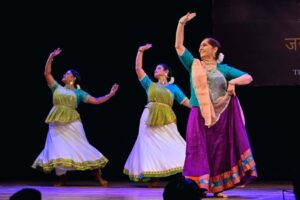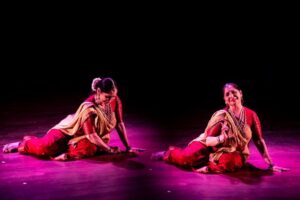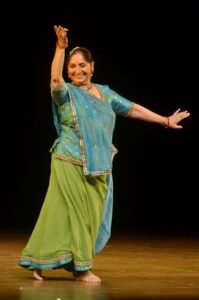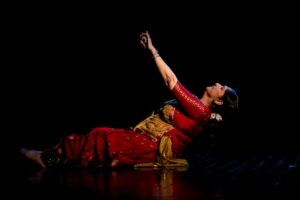Uma Dogra: A Cultural Ambassador Bringing Kathak to Seychelles

In a world where the spotlight often falls on fleeting trends and instant fame, Uma Dogra remains a beacon of dedication and grace in the classical arts. As a distinguished Kathak dancer with a career spanning over 50 years, Dogra recently embarked on a momentous journey as a cultural ambassador for India, representing her country in Seychelles. Uma Dogra’s unwavering dedication to Kathak and her tireless efforts to support young artists reflect her deep commitment to the arts. Her recent tour to Seychelles not only showcased her artistry but also highlighted her role as a cultural ambassador, bridging the gap between traditions and new audiences. I had the pleasure of speaking with her about her recent ICCR tour, her commitment to nurturing young talent, and her lifelong passion for Kathak. Excerpts from the interview:
Congratulations, indeed a great honour to be chosen as a cultural ambassador. How did it feel to represent India in Seychelles?
It was indeed a profound honour to be chosen by the Indian Council for Cultural Relations (ICCR) to showcase our rich and diverse cultural heritage in Seychelles. This tour was particularly special as it marked my second ICCR tour, the first being in 2007. I am deeply grateful to the Ministry of External Affairs and Kartik Pande, the High Commissioner of India to Seychelles, for this opportunity. It’s a moment of immense pride to spread the beauty of Kathak and India’s cultural legacy on an international stage.
Tell us more about your tour and the performances you presented in Seychelles?
The tour was a beautiful experience, especially given the timing, as Seychelles was experiencing its monsoon season. I performed two pieces that highlighted the magic of the rains—Varsha Ritu and a tarana set to teen taal. These pieces, based on Raag Megh, captured the essence of the monsoon with imagery of clouds, lightning, and the peacock’s dance. It was a joy to bring these elements to life for an audience in such a picturesque setting. Additionally, I started the first show with Shiv Anand, which celebrated the beauty and joy associated with Lord Shiva. The aim was to blend our musical traditions with divine themes.
You involved your disciples in this tour too. Why is it important for you to include the younger generation in such events?
It is crucial for me to provide a platform for young and upcoming dancers. This tour included seven of my talented disciples from the third generation. Giving them the opportunity to perform alongside me not only enriches their experience but also ensures that the tradition of Kathak continues to evolve and thrive. I believe in nurturing the next generation and providing them with the exposure and experience needed to carry forward our cultural legacy.
Besides the performances, you also conducted a workshop with local hip-hop students in Seychelles. How did that go?
Conducting the workshop was a delightful experience. I introduced the students to some fundamental aspects of Kathak, such as footwork and chakkar. It was wonderful to see their enthusiasm and curiosity about our classical dance form. Cross-cultural exchanges like these are important because they not only broaden the horizons of the participants but also foster a greater appreciation for different artistic traditions.
Reflecting on your long career, what made this tour stand out for you personally?
This tour was particularly memorable because it was only my second ICCR tour as a soloist and group leader. The first was almost 17 years ago, so this return was significant. Celebrating India’s Independence Day in Seychelles added to the emotional value of the trip. On a lighter note, Seychelles is renowned as a honeymoon destination, and experiencing its natural beauty was a highlight for me and my team. Mr. Pande mentioned that our performance marked the first Indian troupe to perform post-pandemic, which made the experience even more special.
Your career has spanned over five decades. Can you share how you transitioned from a young dancer in Mumbai to a prominent figure in the classical dance world?
My journey began with the loss of my guru, Shri Pt Durga Lal ji, which was a challenging period for me as a young dancer in Mumbai. In my early 30s, I decided to channel my efforts into supporting fellow dancers. This led me to establish the Samved Society for Performing Arts and initiate the Raindrops Festival. For the past 34 years, the festival has provided a platform for emerging talents in Indian classical dance. More than 400 dancers have showcased their skills at Raindrops, and it fills me with joy to see the next generation flourish.
What drives your commitment to promoting young talent through initiatives like the Raindrops Festival?
It is a personal mission for me to support and promote the next generation of Indian classical dancers. I believe that those of us who have been fortunate enough to receive support and success in our careers have a responsibility to give back. By providing young dancers with opportunities to perform and gain visibility, I hope to contribute to the continuation and evolution of our rich cultural traditions. It’s about ensuring that the future of Kathak and other classical arts remains vibrant and dynamic.
Looking ahead, what are your plans for the future, both in terms of your own work and your efforts with the Samved Society?
My focus will continue to be on both my artistic endeavours and my commitment to nurturing young talent. I plan to keep performing and exploring new dimensions of Kathak while also expanding the scope of the Raindrops Festival. Additionally, I hope to engage in more international collaborations and workshops that foster cross-cultural understanding and appreciation of classical arts.
Sandip Soparrkar holds a doctorate in world mythology folklore from Pacific University USA, an honorary doctorate in performing arts from the National American University, He is a World Book Record holder,
a well-known Ballroom dancer and a Bollywood choreographer who has been honored with three
National Excellence awards, one National Achievement Award and Dada Saheb Phalke award
by the Government of India. He can be contacted on sandipsoparrkar06@gmail.com





